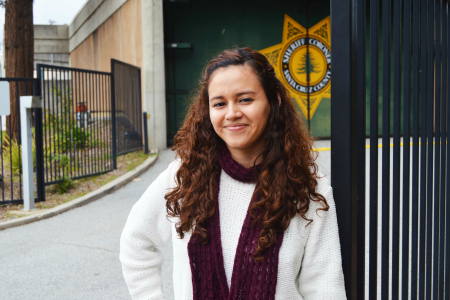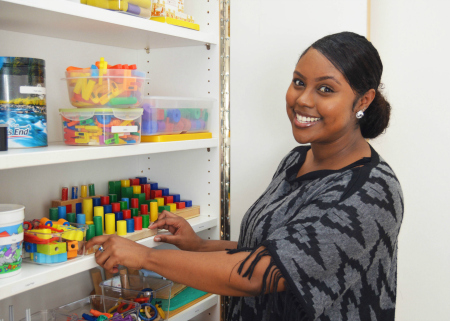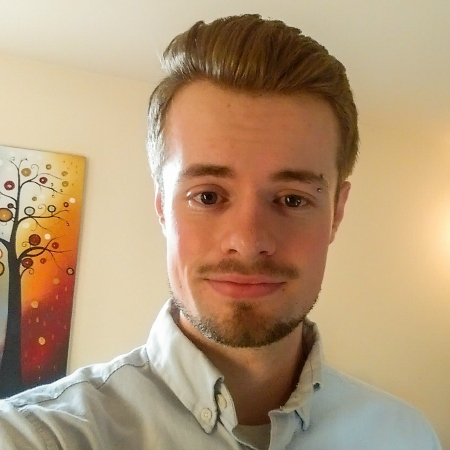Every year, over 200 UC Santa Cruz psychology students provide 40,000 hours of service in the local community through the department’s service learning field study program. They help over 120 different non-profits, schools, and government agencies. They deal with issues like homelessness to mental health, criminal justice to child development, immigration to alcohol abuse. Best part? They are making a difference.
Students help out at places like the Homeless Garden Project, the Innocence Project, andthe ACLU of Northern California. They coordinate grassroots policy efforts at the youth violence prevention organization Barrios Unidos, and mentor undocumented UC Santa Cruz students. Others assist trial attorneys at the Public Defender's office, and answer the domestic violence hotline of the Walnut Avenue Women’s Center.
Diana Rivas (intensive psychology, Merrill College, ’16) interns with Friends Outside, a community nonprofit that prepares people who are incarcerated for a successful release into the community. Every week, Rivas visits inmates at the Santa Cruz County Jail to inform them about resources available to them and their families.
“I decided to work with Friends Outside because I learned about the incarceration complex and the negative effects it can have on a person,” says Rivas, who was inspired by the classes she took with psychology professor and prisons expert, Craig Haney. Haney is the academic supervisor for her placement.
Students are mentored by a faculty member throughout the placement.
“It is a great opportunity to have him as an adviser. He has such great knowledge about the population I work with. I took his classes before and learned a different perspective about the prison complex and its policies. In part, his teaching influenced my choice of placement.”
Integrating hands-on learning and community engagement
The Field Study program is a unique opportunity for students to integrate their coursework with community engagement.
“It is a great opportunity for students to gain hands-on experience and compliment what they learn in the classroom,” says field study coordinator Gail Black.
“But it is more than just volunteering,” Black adds. “There is a lot of reflection involved as well as an academic component. This serves to add much more depth to the field work and educational experience."
Throughout the placement, students are required to keep journals, attend meetings, and go to workshops. They must also complete an academic project related to their experiences in the field.
The experience is rigorous but rewarding.
“It is a great feeling to know that you have positively influenced someone's life even if it may be in subtle or small ways,” says Mitchell Reese (intensive psychology, Crown, ’16) who spent two quarters working for the Y.E.S organization, a program that supports high school students who are in recovery from alcohol and drug addiction complete their education.
“My family has a history with mental illness and addiction, so this population is close to my heart. I was also looking for work that was slightly out of my comfort zone, so that I could push and challenge myself in a context that would be applicable for my career. I wanted to help and make a difference in a population that could use extra support.” Rees adds.
Preparing for a professional track
Thanks to the field study program, students are being pushed out of their comfort zone and onto a career path. It paves the way for careers in clinical psychology, counseling, community relations, social services, law, and further education.
“Placements can prepare students for a professional career and to pursue advanced degrees,” says Black.
Life Courtney Temple (psychology, Oakes, ’16), who is currently applying to graduate school to be a speech pathologist. Temple did her field study placement with the California Children Services (CCS) Medical Therapy Unit, a group who offers occupational and physical therapy to children with spina bifida, muscular dystrophy, and cerebral palsy
Temple’s hands-on experience with CCS helped strengthen her experience in the healthcare field.
“I have always had a strong interest for therapy and its remarkable therapeutic applications in improving the life of many people. Being able to be a part of seeing the first time a person walks, speaks, or accomplishes a task that at first seems impossible is truly a joy,” says Temple.
Temple’s faculty sponsor was psychology professor and language development expert, Nameera Akhtar.
“Professor Akhtar really helped motivate me and pushed me to create research topics that pertained to CCS medical therapy unit,” says Temple.
Unique experiences
For Rivas, Rees, and Temple the field study placement has shown them the importance of keeping an open mind and embracing new experiences.
“The most difficult aspect of working with this population is to not to make assumptions about them and what they need. Many of them come from different backgrounds with different needs,” reflects Rivas.
“The advice I would give to another intern working in this field of work is to be ready to have an emotional transformation,” adds Temple, who like Mitchell and many other students in the program, saw the complexities of people in their everyday context.
“When you first start, you feel sad because of what the children can not do in everyday life, but as you start working with the children your entire perception of people that have disabilities changes,” says Temple. “You start to realize that even if a person has a disability, they are capable of achieving anything in life.”
In 2012, the department received the American Psychological Association (APA) Departmental Award for Culture of Service in the Psychological Sciences.
Declared psychology majors in good academic standing are eligible to apply to the field study program during their junior and senior year. Information about the program can be found on the psychology website here.
The department used funds received from the award to start an endowment for their field study program. To give to the endowment please visit go here.



